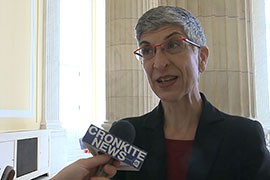- Slug:BC-CNS-Immigration Hesitation,750
- Sidebar: Highlights of the GOP plan
- Video story available on YouTube
- Photos available (thumbnails, captions below)
By WHITNEY OGDEN
Cronkite News Service
WASHINGTON – Arizona lawmakers said a House leadership road map for immigration reform is welcome progress, but not all believe that means long-stalled reform legislation can pass this year.
The six-point plan unveiled last week by House Republican leaders includes calls for tougher border security, a revamped visa system and “no special path to citizenship” for immigrants who are here illegally.
That last point is a key difference from the comprehensive reform bill that passed the Senate in June and has languished in the House since.
Besides the differences between the House and Senate approaches, experts said the issue is still politically risky for many lawmakers, with some Republicans reluctant to sign on to their own leaders’ plan.
“Members are going home to face voters and they’re worried … Republican voters, who don’t quite want reform, will take revenge on them,” said Tamar Jacoby, president and CEO of ImmigrationWorks USA.
Jacoby said some House members may be hesitant to get behind the issue during an election year. That sentiment was echoed by Rep. Ed Pastor, D-Phoenix, who said lawmakers are “caught between two hard rocks.”
“If (a district) has a growing Hispanic population, then maybe immigration reform is not a bad idea,” Pastor said, while a primarily Republican district with voters opposed to reform might make a lawmaker balk.
The House has refused to take up the Senate bill that passed last year – not because members opposed immigration reform, but because the House wanted to take its own step-by-step approach to the issue, Speaker John Boehner has said.
Boehner and other House leaders at a retreat of Republican lawmakers Thursday released “standards” for immigration reform. The standards are general principles that include a “zero-tolerance policy” for illegal border crossers, a verifiable employment verification plan, improvements to the legal immigration system and “no special path to citizenship” for illegal immigrants.
Instead of citizenship, the GOP plan would let illegal immigrants stay here “without fear,” but only after admitting guilt, paying fines and back taxes, becoming proficient in English and showing they can support themselves and their families, among other requirements.
“House Republicans will allow (unauthorized immigrants) to get to legal status, short of citizenship,” Jacoby said. Under the plan, immigrants would be able to get a work permit, to travel and live in the U.S. without fear of deportation, she said.
Under the Senate bill, some illegal immigrants could win citizenship after an application process that would take years, and after they paid fines and back taxes, among other requirements.
Sen. John McCain, R-Ariz., was one of the bipartisan “Gang of 8” that crafted the Senate bill. He said the bill’s path to citizenship was a “middle ground” between those who thought the path was “too long and too hard, (and) some think that we shouldn’t have an automatic path to citizenship at all.”
But he declined to criticize the House plan Wednesday, saying he had not seen any specifics and looked forward to working with the House on the issue.
Even if Congress can reach agreement on a bill, McCain said, Republicans worry that President Barack Obama will ignore it.
“Suppose we pass laws to secure the border … and the president doesn’t enforce the laws?” McCain asked. “The president has got to assure all of us that whatever law we pass he will … enforce.”
Other GOP House members said they do not trust Obama to keep border security tight, pointing to executive actions to defer deportation of some immigrants who are here illegally.
“There is a great distrust … towards the administration,” Rep. Mario Diaz-Balart, R-Fla., said in a conference call Friday. “Can we put together a legislation that secures the border … that makes sure that this or future administrations have to enforce the border … whether they like it or not?”
The House plan specifically says any bill must ensure “that a president cannot unilaterally stop immigration enforcement.”
But Rep. Raul Grijalva, D-Tucson, said claims of distrust of Obama were just more “delaying tactics” by opponents.
In an interview Wednesday on MSNBC, Grijalva said it’s hard to be optimistic for reform this year when the delays are becoming a “political tease” and the policies provide “more questions than answers.”
Pastor was just as pessimistic, saying he “didn’t see any glimmer of hope” for a comprehensive immigration bill out of the House this year.
Jacoby was more optimistic.
“I do think that there’s a little bit north of a 50/50 chance that they’ll do it this year,” she said.
^__=
Web Links:
_ GOP immigration “standards”: http://www.speaker.gov/general/draft-standards-step-by-step-immigration-reform
_ Senate immigration reform bill: http://www.gpo.gov/fdsys/pkg/BILLS-113s744es/pdf/BILLS-113s744es.pdf
_ ImmigrationWorks USA: http://www.immigrationworksusa.org/
^__=
SIDEBAR:
Road map to reform
The “Standards for Immigration Reform” unveiled by House GOP leaders last week include six guiding principles:
– Border security and interior enforcement: Set a zero-tolerance policy for those who come here illegally or overstay their visas.
– Entry-exit visa tracking system: Implement a biometric identity verification system to prevent fraud.
– Employment verification system: Implement an electronic employment verification system to end the paper-based system and stop fraud.
– Reform the legal immigration system: Revamp the visa system to address economic and workforce needs.
– Child-exception rule: Provide a way to citizenship for those brought to the U.S. illegally as children.
– No “special” path to citizenship for illegal immigrants: Unauthorized immigrants could get a legal status and work in the U.S. after meeting several requirements. (Criminals, gang members and sex offenders would be ineligible.)
^__=
Sen. John McCain, R-Ariz., said he looks forward to working with House lawmakers on immigration reform. McCain was a lead sponsor of a Senate reform bill that passed last summer but stalled in the House.plan. The current House plan would not include a path to citizenship, as the Senate bill does. (Cronkite News Service photo by Whitney Ogden)
Tamar Jacoby, president of ImmigrationWorks USA, outlined challenges to passage of an immigration reform bill. But she was more optimistic than some that a plan could be approved by the House this year after GOP leaders unveiled their principles for reform last week. (Cronkite News Service photo by Jillian Idle)

